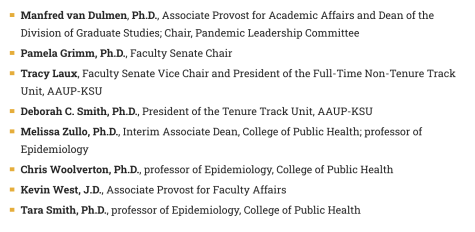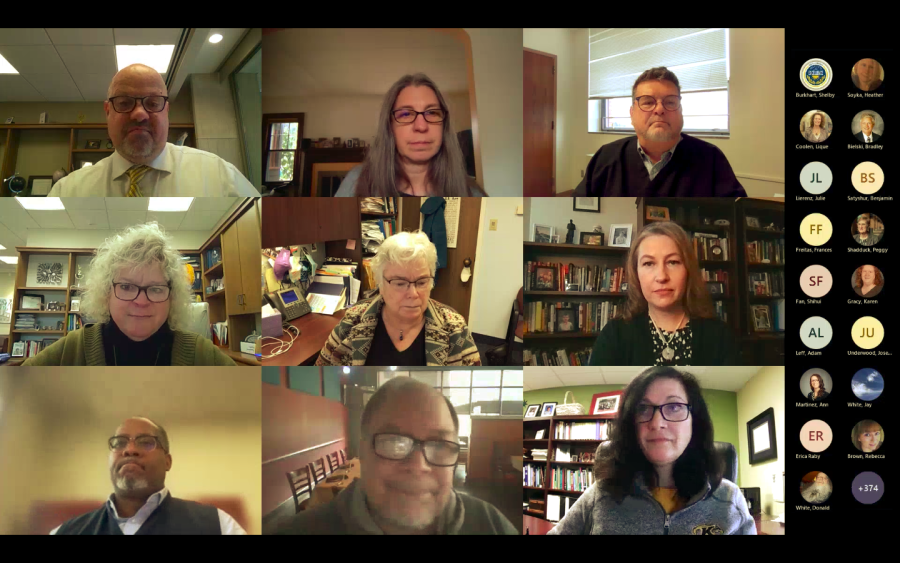Non-compliant students will be allowed in classrooms, despite vaccine requirement
Faculty share concerns, ask questions about Kent State’s spring COVID-19 protocols during town hall
Kent State faculty members chatted up their COVID-19 concerns during a virtual “town hall” meeting Jan. 13, as university officials on the panel answered mostly predetermined questions, leaving many issues raised in the discussion section unaddressed.
Many of the attendees expressed serious concerns about their safety in the classroom, particularly amid the record number of cases and hospitalizations for COVID-19 in Ohio and nationwide, and asked questions about new protocols that were communicated Jan. 3 by email to the university.
“With some students not vaccinated and not compliant with the mandate, will these students be allowed into my classroom?” asked a professor. The reply came quickly within the chat. “Spoiler: the answer is yes. Unvaccinated students are allowed in our classrooms.”

As of Jan. 7, overall employee vaccine compliance was at 85 percent, faculty compliance was at 99.6 percent and student compliance at 77 percent, Melissa Zullo, interim dean of the College of Public Health, said. Regional campus faculty are 100 percent compliant with the vaccine requirement, while the Kent campus faculty are 99.5 percent compliant, driven largely by vaccinations rather than exemptions.
On the Kent campus, 81 percent of students are compliant with the vaccine requirement, but on the regional campuses, compliance among students ranged from 57 to 68 percent. That means anywhere from 19 to 43 percent of students, depending on which campus is involved, have not registered or completed their vaccination status and could still be unvaccinated, or that they do not have a valid exemption.
The COVID-19 vaccine FAQ page, as of Jan. 16, states that students who were unvaccinated or who did not have a valid exemption by Dec. 20, 2021, will be “ineligible to participate in on-campus experiences, including in-person classes or living in the residence halls” during the spring semester.
But during a Nov. 17, 2021 “town hall” meeting with university representatives, KentWired reporter Alexandra Golden asked what would happen to students who had not provided proof of vaccination or did not have an approved exemption on file with Kent State. The question, sent to [email protected] because the discussion’s chat function was not working, received an automated reply that stated, “Unless you are vaccinated or have an active exemption for the semester you have registered for, you will be de-registered from any in-person courses you register for.”
Golden included the information in a story about the town hall meeting, but the next day, she received an email from Eric Mansfield, assistant vice president for university communications and marketing, that said the automated response from [email protected] had been “modified” and the sentence about being deregistered was no longer included.
Instead, Mansfield said, the university “guidance” would be that “If you have not uploaded your vaccine information or if you have an exemption on file or if you’re not vaccinated you will be invited for regular weekly testing during week two” of the spring semester.
The possibility of a booster shot mandate was asked several times in the chat, but there was no comment from administrators.
Panelists discussed the university’s new recommendation to wear KN95 face coverings and remove the physical distancing requirement in classrooms at the meeting Thursday. Professors are permitted to remove their masks while teaching but must maintain a six-foot distance from others in the room.

“As Manfred mentioned, we’re not doing social distancing in classrooms,” said Deborah Smith, a philosophy professor, in the chat. “We’re upping our masking game instead.” Smith is also the president for the tenure-track unit of the Kent State chapter of the American Association of University Professors, which is the union that represents faculty.
“We’ve not seen outbreaks coming from our classrooms in the past,” said Zullo. “I do believe that our safety measures, when they are implemented correctly, are good safety measures and they do keep the students and faculty safe.”
The university stated it will supply faculty, staff and on-campus students with new face coverings. For students living off-campus, face coverings will be available at various campus locations on a first-come, first served basis.
At the time of the meeting, COVID-19 cases in Portage County were still high, said Tara Smith, an epidemiologist and professor in the College of Public Health.
“We are still at a level that is about double that of Ohio in general,” Smith said. “When you look per 100,000 population we are at about a little over 2,000 in Portage County and about over 2,600 cases per 100,000 individuals in Kent city.”
According to Ohio’s coronavirus dashboard, using data pulled from Dec. 30, 2021, through Jan. 12, 2022, Portage County’s rate of cases per 100,000 population dropped to about 1,491, while the statewide average was 1,883 per 100,000. Recent new daily case counts in Portage County appeared to peak at 428 on Dec. 28, 2021.
While professors were told they could use the Family and Medical Leave Act (FMLA), a graduate instructor raised the question in an email to KentWired about their options if they feel unsafe teaching in person, as they are not in the same position as other faculty.
“It was recommended to some concerned faculty to take FMLA or retire if they did not feel comfortable teaching in person,” she said. “It’s not clear where that leaves adjuncts and student instructors in departments where in-person instruction is not optional.”
Professors do not have the option to take their face-to-face classes online, beginning spring semester, but do have short-term options to use distance learning if they become ill or are quarantined.
Chris Woolverton, an epidemiology professor, explained the “swiss cheese model” of handling COVID-19, which means mitigation measures that may not be 100% effective are layered one on top of the other until they form a cohesive, solid defense. The recommended layering steps are vaccination, booster shots, face masks and physical distancing.
But later, Woolverton made the remark “go for a walk around campus before getting in your car,” saying COVID-19 evaporates after an hour. The comment riled several of the meeting attendees.
“Gee, maybe we should tell the whole world that, and all our problems will be solved,” the graduate instructor said in her email. “Just go for a walk and you’ll be fine.”
After realizing the reaction many of the attendees had toward his “take a walk” comment, Woolverton apologized in the chat.
“My comment was not meant to be discourteous, just another mitigation strategy. Sorry!” Woolverton said.
The choice between financial stability and exposing their immunocompromised child to potential infection was a concern left in the chat from a faculty member.
“Our department does not permit us to teach assigned classes online, and therefore we have no option but to teach in person,” they said. “I have no choice but to choose between financial health and the health of my immunosuppressed child.”
Questions about how the university will manage students who refuse to comply with the university mask mandate also arose.
“If a student refuses to wear a face covering, you should follow the Classroom Disruption University Policy,” said Tracy Laux, vice chair of Faculty Senate and president of the full-time non-tenure track unit of AAUP-KSU, in the chat. “If they refuse, ask the student to leave. If they refuse, you can cancel that class meeting and follow up with the student conduct process. Certainly if the student is disruptive, you can call campus police.”

Since weekly testing is only required for unvaccinated students who live on campus, regional campuses will have no way to tell whether those students are coming to campus with active COVID-19 cases.
“Unvaccinated students will be required to test and we have staff who are monitoring,” said Senior Vice President and Provost Melody Tankersley in the chat. It was not noted if this includes off-campus students.
Fully-vaccinated, on-campus students who are compliant with registering their vaccine status, and those who have had COVID-19 in the past 90 days, are exempt from the weekly testing.
Students living on campus who test positive as they return to school were informed via email Jan. 14 that it is their “responsibility” to make a plan for their isolation.
It is “highly recommended you return home for isolation and rest. For those who cannot return home, the university will coordinate with you to determine a viable plan for your isolation on campus,” said Chief University Physician Lisa Dannemiller.
“With the omicron surge and the high transmissibility of this variant, we are concerned with the case numbers of COVID and how many cases we will have on campus,” Dannemiller said. “We do have isolation and quarantine dorms as we have in the past. Most students at Kent have preferred to go home to isolate during this pandemic. Students can choose to isolate on campus as long as rooms are available.”
Centennial Courts E and F and Verder halls will be used as quarantine and isolation dorms.

College Credit Plus students are not factored into the vaccine requirement. However, any who are eligible for an FDA approved vaccine and who wish to take in-person classes on one of the campuses should be vaccinated, according to the university website.
A faculty member with a student who cannot attend their class is not required to livestream or provide additional material for that student, even if a Student Accessibility Service accommodation is presented.
“A student who’s making a request based on a need for accommodation can work with [Student Accessibility Services] to verify the need for the accommodation,” Tankersley said. “SAS will work with the faculty to determine a reasonable accommodation. However, even a faculty member cannot under any circumstances… be required to livestream a class. Even when an accommodation request is received.”
This doesn’t mean faculty can’t livestream their courses, but the administration is not requiring them to do so, in an effort to curb the extra workload on faculty and staff.
The university’s mission is to return in-person, Tankersley said, due to the fact “that’s what our students signed up for when they enrolled.”
She acknowledged the frustrations and concerns that go along with in-person instruction during the pandemic, but said parents and students have been calling in to ask about it.
“I can promise you we’ve gotten just as many calls and maybe even more in emails and from students and parents who demand to be in person,” Tankersley said toward the end of the meeting. ”There doesn’t always feel like a right answer that satisfies everyone. I know that we’re all doing our best to work together to support one another.”
One faculty member asked if professors might be harmed by bad reviews from students because of the unstable classroom environment caused by the COVID-19 climate.
“I am personally concerned that Flash Surveys now ‘count’ for evaluation purposes given that this semester, and last, felt less predictable to me than 2020-21 when we could comfortably settle into mostly remote [and] online delivery,” they said. “I feel that there is too much potential for emergent circumstances and the need to adapt puts faculty at a disadvantage as regards student evaluations.”

Another commenter responded to an earlier post and said her colleague’s concern “reflects my deepest disagreement with the stubborn and willful push of admin to only do face-to-face–they are claiming to abide by science but are following the protocols of Alpha and Delta rather than Omicron, and reacting to politics rather than moving with bravery.”
Faculty with additional questions were encouraged to submit questions to [email protected]. Unanswered questions will be added to the university’s FAQ page at a later date, Tankersley said.
Editor’s note: Faculty members commenting in the chat have been granted anonymity because they were unaware of the reporter in attendance.
Kaitlyn Finchler is general assignment editor. Contact her at [email protected].
Kaitlyn is a senior majoring in journalism with a minor in public relations. In her four years with KentWired, she has served as Digital Content Manager,...














